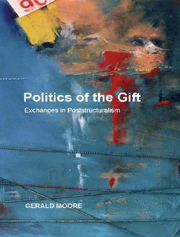Book contents
- Frontmatter
- Contents
- Acknowledgements
- Abbreviations
- Series Editor's Preface
- Introduction: Spectres of Mauss
- 1 Speech, Sacrifice and Shit: Three Orders of Giving in the Thought of Jacques Lacan
- 2 The Eternal Return of the Gift: Deleuze (and Derrida) contra Lacan
- 3 Repeating the Political: Heidegger and Nancy on Technics and the Event
- 4 ‘Pour en finir avec …’: Democracy and Sacrifice
- Conclusion: Variations on a Theme from Nietzsche
- Bibliography
- Index
Introduction: Spectres of Mauss
Published online by Cambridge University Press: 12 September 2012
- Frontmatter
- Contents
- Acknowledgements
- Abbreviations
- Series Editor's Preface
- Introduction: Spectres of Mauss
- 1 Speech, Sacrifice and Shit: Three Orders of Giving in the Thought of Jacques Lacan
- 2 The Eternal Return of the Gift: Deleuze (and Derrida) contra Lacan
- 3 Repeating the Political: Heidegger and Nancy on Technics and the Event
- 4 ‘Pour en finir avec …’: Democracy and Sacrifice
- Conclusion: Variations on a Theme from Nietzsche
- Bibliography
- Index
Summary
If the people of Dogville have a problem with acceptance, what they really need is something for them to accept. Something tangible, like a gift.
Lars von Trier's Dogville (2003) opens with the self-appointed philosopher-in-residence of a tiny mountain hamlet speculating over a solution to the moral shortcomings of his neighbours. Thomas Edison, Jr (Paul Bettany) hazards that what is needed to awaken the townsfolk of Dogville from their dogmatic slumbers is something new, something different, something suggestive of a future. ‘Something tangible, like a gift.’ The gift duly arrives in the form of a beautiful young runaway (Nicole Kidman), who stumbles accidentally upon the town after taking fiight from an unspecified figure of authority. Appropriately, she is called Grace – a name connoting God's gift of unmerited and spontaneous, unconditional salvation. As the film's narrator observes, Grace ‘hadn't chosen Dogville from a map, or sought out the town for a visit. She had elected to give herself up to him at random, as – yes – a gift. Generous, very generous, thought Tom.’
After a difficult start, the people of Dogville warm to Grace, who, under Tom's guiding influence, distinguishes herself by giving them precisely what they do not need, doing the jobs that no one knew needed doing prior to her arrival. This early phase of warmth does not last, however.
- Type
- Chapter
- Information
- Politics of the GiftExchanges in Poststructuralism, pp. 1 - 31Publisher: Edinburgh University PressPrint publication year: 2011



